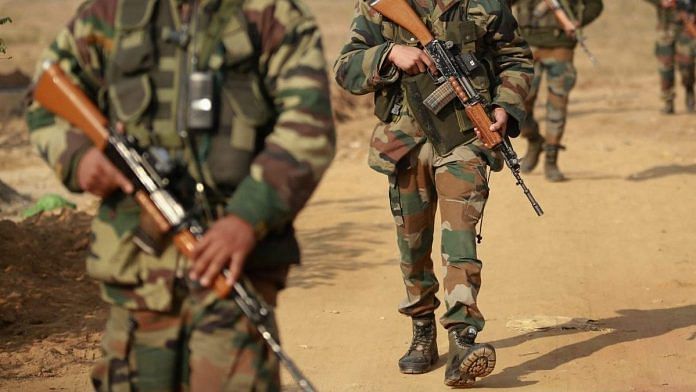New Delhi: A number of litigant women Army officers, who have been battling in court for nearly 14 years seeking grant of permanent commission, have said they reject the force’s offer to go home with a pension on completion of the mandatory 20 years of service.
“We say no to such freebies. Our fight is not for pension but parity. We will continue fighting for permanent commission,” a female officer litigant told ThePrint on condition of anonymity.
The comments came after sources in the Army told ThePrint this week that the force is agreeable to pension for these litigants, but not open to granting them permanent commission.
This group of 332 women Army officers — commissioned on Short Service Commission (SSC) in 1993 or afterwards — has petitioned the Supreme Court seeking permanent commission. SSC means a limited period career in the armed forces.
“Some of us have served for nearly 25 years now in the Army, so by default we are eligible for pension. What the Army is offering me is only release from service. It is a battle for our identity. We are not seeking charity,” said the officer.
The officer said that despite the March 2010 Delhi High Court order, “we have been denied promotions, study leaves or even courses for career progression in all these years citing that the matter is subjudice, despite no stay from the Supreme Court”.
She was referring to the HC ruling in favour of granting permanent commission to women on SSC. The officers, some of whom had retired by then, were reinstated following the order.
However, the Centre moved the apex court later challenging the HC verdict. The case has been in apex court since, with this group of officers being denied promotions in this period.
These Army women have been represented since the case has been in the High Court by their lawyer Meenakshi Lekhi.
At present, women officers are not eligible for permanent commission in all but two branches — in Judge Advocate General and Army Education Corps.
The Army plans to start permanent commission for women in all its branches from April this year. But it is against granting the benefit retrospectively to women, despite the SC asking it last year to consider such a provision for SSC women officers who were inducted before March 2019.
Also read: CDS wants appointment of military officers as joint secretary in defence ministry
‘Why project Tania Shergill’
Speaking to ThePrint, a second woman officer, who is also a litigant in the case, said that despite having performed ground soldiering duties at several forward locations, and having excelled in them, it is unfair to deny her any promotion.
“So, while you project Captain Tania Shergill as a woman leading a contingent in the Republic Day parade, you don’t make her eligible for a permanent commission in the Army because she joined the service before a certain date,” the officer said.
Corps of Signals’ 26-year-old Shergill last month became the first woman Parade Adjutant in the history of the Army Day function.
Loss of seniority
The litigant women officers also complained about loss of seniority due to an allegedly discriminatory policy.
The service tenure of an SSC officer is an initial period of five years, which is extendable by a period of five years and then by four years, making it 14 years.
While the litigants were offered an extension of four years after completion of 10 years, it was done without a policy in place, according to them.
A policy came subsequently in 2006, which said these officers would retire after 14 years of service with the loss of seniority due to issues with period of training at the Officers Training Academy (OTA) in Chennai.
Their seniority was reduced by one year owing to their six-month period training at OTA. As a result, despite having served for 14 years, they were being retired as ‘Major’, a rank which comes in the pay band 3.
This was contrary to a male SSC officer, who by virtue of having undergone a nine-month training at OTA, was retiring as a ‘Lieutenant Colonel’ at pay band 4, even though he had picked up the rank for just three months.
In a note to the Supreme Court, the Centre had said that women officers were given a shorter pre-commissioned training because their employment was for a limited period.
Countering the women officers’ argument, a source in the Army said the loss of service year for SSC officers, male or female, at the completion of their tenure was always there.
“When you join the organisation, there is a certain HR policy, which you have to understand. As and when the policy changed after the first five years and subsequently the second five years, they had an option to continue with the changed policy or exit.
“The women officers, being from initial batches, chose to remain with the organisation, being fully aware of existing policies, or in anticipation of newer policies,” added the source.
‘Recommendations of study group ignored’
A panel commissioned by the Army to carry out a holistic review of the employment and management of women officers in the Army had recommended that such officers who have 14 or more years of service should be put through selection board for permanent commission and promotion at par with men officers.
Headed by Lt. Gen. Gyan Bhushan (Retd), the panel said women officers should also be given the opportunity to attend requisite courses and those not empanelled in the board should be granted pension on completion of 20 years of service as a one-time measure.
The report was never made public, a third officer claimed. But it was presented in the court, she added on condition of anonymity.
Also read: Retirement age of military personnel should be raised to 58, says CDS Bipin Rawat



